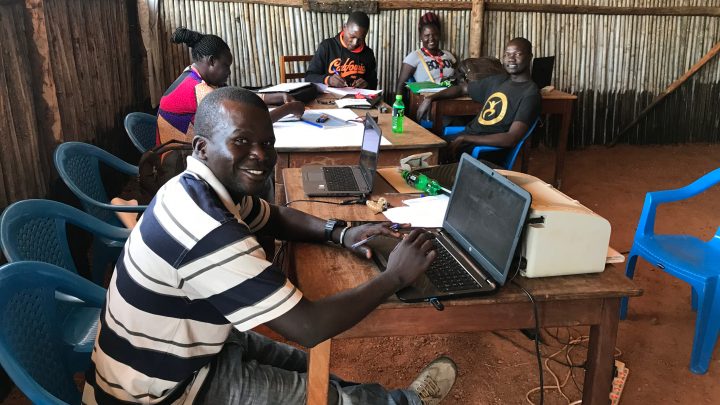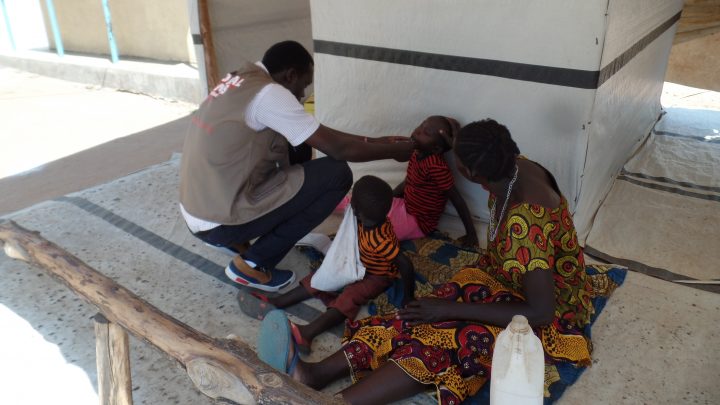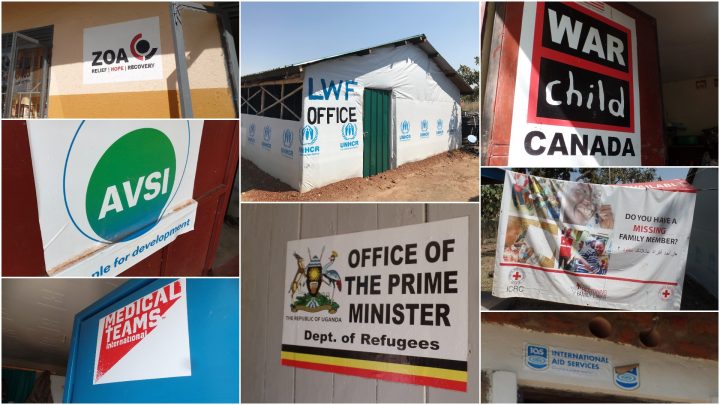A young boy down by the river was yelling at a cow. He had the same pose my niece has when she’s yelling at the neighbour’s dog. I could almost hear him yelling “No Frankie, this is where I play and that’s where you play!” He wasn’t of course. I have no idea what he was saying. He seemed to be quite entertained by the cow though.
The young cow-yeller is one of hundreds of thousands of children who have fled to northern Uganda, escaping violence and political instability in South Sudan. Since December 2013, over one million South Sudanese have fled their homes to Uganda, which now has the dubious distinction of being the top refugee-hosting country in Africa and third in the world.
In response to the massive assistance and protection needs, the UNHCR-led Refugee Emergency Telecommunications Sector (RETS) mobilised for the very first time to provide shared internet connectivity, security communications and user support services to UNHCR, partners and the wider humanitarian community. Over 500 humanitarians are now using RETS internet connectivity at six sites across northern Uganda – Bidibidi, Imvepi, Ocea, Palabek, Palorinya and Rhino settlements.

© Mariko Hall – RETS is providing shared internet connectivity to over 500 users from UNHCR, partner and other humanitarian organisations in 6 locations across northern Uganda.
Enabling Better and Faster Protection & Humanitarian Assistance
“Internet is our day to day work,” said Zewdie HaileSelassie, UNHCR Ethiopia Associate ICT Officer deployed to support RETS Uganda. “We need internet for reporting, for online registration, for everything. Partners told me that to get a report from the field takes more than a month because information needs to be manually compiled in each location, and then in Kampala, before being sent back out. There are online systems of course, but without internet they’re of no use.”
UNHCR works with 80 UN, NGO and government organisations in northern Uganda to meet the needs of South Sudanese forced to flee. For each of these organisations, access to the internet helps them save lives.
Senior Clinical Officer with Medical Teams International in Imvepi settlement said the internet enables them to do their regular reporting and information sharing, but also rapidly communicate alerts. “If we have a disease outbreak, that has to be reported immediately, regardless of the usual time of other reports. We had a case of measles and with the internet we could report it immediately.”

© Mariko Hall – Senior Clinical Officer with Medical Teams International in Imvepi settlement uses RETS internet connectivity to rapidly communicate alerts, like outbreaks of highly contagious diseases.
War Child Canada focuses on legal protection for victims of Sexual and Gender Based Violence, from case management and medical referrals to free representation in the court of law. The Legal Officer in Rhino settlement said “I use the internet to research and keep up to date so that I give beneficiaries the right laws and give the community accurate information.”
Social Worker with Transcultural Psychosocial Organisation (TPO) in Palabek settlement, works with refugees suffering from Post-Traumatic Stress Disorder and provides cognitive behavioural therapy for children. She also uses RETS internet services to communicate and research. “The more I read about different developments, the more ways I get to deal with my clients in the field. The internet gives me more information and links me to the world out there.”

© Mariko Hall – Within the framework of the Refugee Coordination Model, RETS deploys within 72 hours of the activation of an emergency to provide shared telecommunications services to UNHCR, its partners and the wider humanitarian community. In Uganda, over 500 users from 45 different organisations rely on RETS internet connectivity.
First Ever RETS Deployment
Bidibidi, the largest settlement in northern Uganda – host to 287,087 South Sudanese refugees – was the first site in which RETS ‘went live’. “At the start, we used existing UNHCR infrastructure to provide shared services,” said Abdalla Khalil, RETS Coordinator. “We configured a separate connection on the UNHCR satellite terminal so that partners could have access.”
RETS services are intended to fill critical communications gaps only – national commercial operators are always preferred. Leveraging an existing UNICEF long term agreement, RETS coordinated with a national Internet Services Provider (ISP) for them to extend their coverage to key UNHCR operating areas.
“In Palabek, before RETS, there was no way of getting internet or making phonecalls at all,” said Zewdie. “Ocea was also a dead zone in terms of connectivity. When we extended the line, everyone was very very happy.”
RETS connectivity is accessible at all six locations via voucher, similar to the way you would connect to the internet at a hotel.
UNHCR works in close cooperation with the Office of the Prime Minister (OPM) in Uganda, who are also key users of RETS internet connectivity services.
“We are proud to be the first operation for a full RETS deployment and grateful for the support this service has extended to our staff, partners and beyond,” said Ilham Abdullayev, Assistant Representative – Programme, UNHCR Uganda. “Uganda is receiving refugees from South Sudan in the north, as well as from DRC in the south west. Internet through RETS helped us during the emergency expansion phase so that our partners and other responding organisations could focus on meeting the needs of refugees.”
While having received generous donations from the United States of America, European Union, United Kingdom, Germany and Japan, the UNHCR Uganda operation has a funding shortfall of US$348.7 million, 64% of the total amount required.
Next Steps
With the South Sudanese refugee population only increasing – over 350,000 people arrived in Uganda in 2017 alone – the demand for UNHCR’s presence here will sadly not subside any time soon, and internet connectivity in these previously uninhabited areas will continue to be essential.
In close collaboration with the country office and regional ICT teams, over the coming six months RETS services will be transitioned from ‘emergency’ to ‘Business as Usual’, defining a model for future funding and ongoing user support. RETS and Uganda ICT will work with humanitarian organisations across the six locations to identify longer-term internet service provision.
As the first deployment of RETS, there is much to learn from the Uganda operation. RETS continues to develop its people, processes and technology, preparing for the next emergency so that effective internet can be provided to humanitarians supporting people forced to flee, including the little cow-yeller.
For more information about RETS Uganda, see: Connecting to RETS Uganda Services
As the global refugee organization of the United Nations, UNHCR has a historic, mandated responsibility to protect refugees, and to coordinate action on their behalf. The Refugee Emergency Telecommunications Sector (RETS) is the mechanism through which UNHCR coordinates the inter-agency communications technology response in refugee situations.
